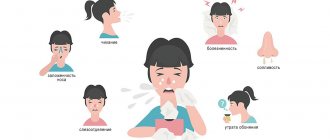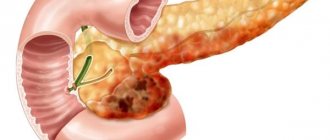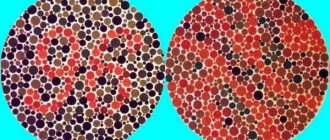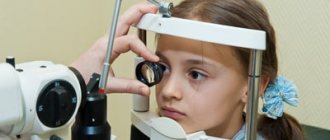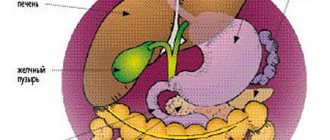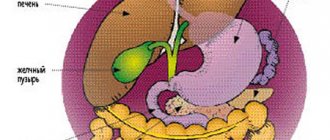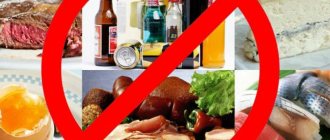Chronic pancreatitis (CP) is a long-term inflammatory disease of the pancreas, with manifestations in the form of irreversible changes in the structure of the organ, which cause pain and/or a persistent decrease in its function.
The pancreas performs important functions:
- secretion of most digestive enzymes
- production of insulin (a hormone whose deficiency develops diabetes mellitus)
There is a worldwide trend toward an increase in the incidence of acute and chronic pancreatitis, more than doubling over the past 30 years.
Reasons for the development of pancreatitis
The most common cause of chronic pancreatitis is alcohol consumption, and the quality and raw materials from which the drink is made do not matter.
Other reasons
- Toxins and metabolic factors:
- alcohol abuse
- smoking
- increased calcium levels in the blood (develops in patients with a tumor of the parathyroid glands)
- overeating and eating fatty foods
- protein deficiency in food
- effects of medications and toxins
- chronic renal failure
- Blockage of the pancreatic duct:
- stones in this channel
- due to dysfunction of the sphincter of Oddi
- blocking of the duct by a tumor, cysts
- post-traumatic scars of the pancreatic ducts (complication of endoscopic procedures: papillosphincterotomy, stone removal, etc.)
- Pathology of the gallbladder and biliary tract.
- Pathology of the duodenum.
- Consequences of acute pancreatitis.
- Autoimmune mechanisms.
- Heredity (gene mutations, 1-antitrypsin deficiency, etc.).
- Helminths.
- Insufficient oxygen supply to the pancreas due to atherosclerosis of the vessels supplying blood to this organ.
- Congenital anomalies of the pancreas.
- Idiopathic chronic pancreatitis (the cause cannot be determined).
Symptoms of pancreatitis
- abdominal pain: usually the pain is localized in the epigastrium and radiates to the back, increasing after eating and decreasing when sitting or bending forward
- nausea, vomiting
- diarrhea, steatorrhea (fatty stool), increased stool volume
- bloating, rumbling in the stomach
- weight loss
- weakness, irritability, especially on an empty stomach, sleep disturbance, decreased performance
- the symptom of “red drops” is the appearance of bright red spots on the skin of the chest, back and abdomen.
If such symptoms appear, it is recommended to undergo examination to exclude chronic pancreatitis.
Pancreatitis in children
In young children, pancreatitis is usually a consequence of congenital malformations of the digestive system or enzyme deficiency. It can also be a complication of mumps (mumps). In older children, the development of the disease may be associated with poor nutrition (including abuse of sweets and carbonated drinks) or caused by intestinal parasites.
Children are often unable to clearly formulate their complaints, what and how they hurt. Therefore, at the first signs of the disease (the child’s complaints of abdominal pain, nausea, vomiting, unstable stool with impurities of undigested food), you should immediately consult a doctor. Infants with pancreatitis cry hysterically and quickly lose weight. Their tummy is swollen.
It is necessary to diagnose the disease promptly and begin treatment to prevent loss of the pancreas.
More information about pancreatitis in children
Complications of chronic pancreatitis
If left untreated, possible complications of chronic pancreatitis include:
- diabetes
- vitamin deficiency (mainly A, E, D)
- increased bone fragility
- cholestasis (with and without jaundice)
- inflammatory complications (inflammation of the bile ducts, abscess, cyst, etc.)
- subhepatic portal hypertension (fluid accumulation in the abdominal cavity, enlarged spleen, dilation of the veins of the anterior abdominal wall, esophagus, liver dysfunction)
- effusion pleurisy (fluid accumulation in the membranes of the lungs)
- compression of the duodenum with the development of intestinal obstruction
- pancreas cancer.
Severity of chronic pancreatitis
There are three degrees of severity of chronic pancreatitis:
Mild degree
- exacerbations are rare (1-2 times a year), short-lived
- moderate pain
- no weight loss
- no diarrhea, no fatty stools
- Coprological examination of stool is normal (no neutral fat, fatty acids, soaps)
With mild severity of chronic pancreatitis, long courses of medication are usually not required, since lifestyle changes and giving up bad habits often prevent relapses.
Average degree
- exacerbations 3-4 times a year, occur with prolonged pain syndrome
- There may be an increase in amylase and lipase in the blood
- periodic loose stools, greasy stools
- there are changes in the coprogram
With moderate severity of chronic pancreatitis, a strict diet, longer courses of therapy, and constant supervision by the attending physician are necessary.
Serious condition
- frequent and prolonged exacerbations with severe, prolonged pain syndrome
- frequent loose stools, fatty stools
- loss of body weight, up to exhaustion
- complications (diabetes mellitus, pseudocysts, etc.)
In severe cases of chronic pancreatitis, constant maintenance therapy, stronger medications and a strict diet are required. Often, patients need careful monitoring not only by a gastroenterologist, but also by doctors of other specialties (endocrinologist, surgeon, nutritionist). Emerging exacerbations, as well as complications of the disease, pose a threat to the patient’s life and, as a rule, are an indication for hospitalization.
The presence of chronic pancreatitis, regardless of severity, requires immediate consultation with a doctor, since without treatment and lifestyle changes, the process will steadily progress.
Diagnosis of pancreatitis
The EXPERT Clinic has an algorithm for diagnosing chronic pancreatitis, which includes:
Laboratory methods:
- A clinical and biochemical blood test is performed (of particular importance is the level of pancreatic enzymes in the blood - amylase, lipase)
- coprogram - the presence of certain substances in the stool (fats, soaps, fatty acids, etc.) is assessed. Normally, they should be absent, but in chronic pancreatitis, due to insufficient production of enzymes by the gland to break down these substances, they remain undigested and are detected in the feces
- fecal elastase is an enzyme of the pancreas, the level of which decreases when it is not working enough
- in certain cases, it is important to determine cancer markers
- If a hereditary genesis of the disease is suspected, a genetic examination of the patient is carried out.
Instrumental studies
- Ultrasound of the abdominal cavity. Signs of inflammation of the pancreatic tissue, the presence of stones in the ducts, calcifications, cysts, and tumors of the pancreas are assessed. Additionally, changes in other organs of the gastrointestinal tract are determined to exclude complications of the disease, as well as concomitant pathologies.
- Elastography of the pancreas.
Allows you to determine whether there is fibrosis (hardening) of the pancreas, which is a criterion for the severity of structural changes in the organ. Ultrasound with elastography of a healthy pancreas - FGDS. Visualization of the duodenum is necessary to assess the presence of inflammation in it, as well as indirect signs of pancreatitis. It is necessary to exclude inflammation and pathological formations (tumor, diverticulum) in the area of the large duodenal nipple (through it, pancreatic secretions enter the duodenum; when it is blocked, the outflow of this secretion is disrupted, which leads to inflammation of the gland tissue). Visualization of the stomach and esophagus is necessary to exclude erosions, ulcers, and inflammation in them. Pathological changes in these organs are often combined with chronic pancreatitis, being mutually aggravating conditions.
- Additionally, CT and MRI of the abdominal cavity with cholangiography and RCHP may be prescribed. They are necessary to confirm the diagnosis, and are also prescribed if there is a suspicion of the presence of pathological formations in the pancreas, blockage of the gland ducts with a stone, tumor or cyst.
How to treat pancreatitis of the pancreas
Three rules in the treatment of this pathology - rest, cold and hunger:
- rest slows down blood circulation and reduces blood flow to the diseased organ;
- cold compresses on the hypochondrium area reduce the temperature of inflammation and the severity of pain;
- Fasting for 1-6 days stops the production of enzymes that cause inflammation.
Additionally, conservative treatment is prescribed using medications, physiotherapy and herbal medicine.
Drug treatment:
- antispasmodics and NSAIDs to eliminate spasms of the gastrointestinal tract and inflamed pancreas;
- antibiotics - with an active infectious process;
- antisecretory drugs - to suppress external (enzyme) and internal (hormonal) secretion;
- pancreatic enzymes - to maintain healthy digestion during the period of treatment, as well as in case of significant degeneration of glandular tissue;
- Insulin preparations – in case of damage to hormone production areas.
Physiotherapy is included in treatment after the acute phase of inflammation has resolved. The most effective methods:
- electrophoresis with painkillers and anti-inflammatory drugs increases the intensity of their action, better relieves pain and inflammation;
- ultrasound is used as an anesthetic for shingles pain syndrome;
- diadynamic currents - exposure to low-frequency impulses improves blood supply, enhances tissue metabolism, relieves pain;
- laser and UV irradiation of blood relieve inflammation, improve microcirculation of liquid media and tissue regeneration;
- an alternating magnetic field successfully helps eliminate swelling and inflammation.
Herbal medicine is used as an accompanying treatment - to enhance the effect of medications and eliminate possible side effects. For these purposes, plants with anti-inflammatory, detoxifying, antispasmodic, and calming effects are used. These include chamomile, calendula, St. John's wort, wormwood, dandelion, burdock, golden mustache, motherwort, immortelle, barberry, caraway and a number of other herbs that are used both individually and as part of complex collections.
In severe cases, when conservative treatment methods do not help, they resort to surgical removal of the organ or part of it, followed by the appointment of enzyme replacement therapy on an ongoing basis. Indications: complete disintegration of the organ, the presence of cysts, necrosis, tumors, abscesses, fistulas, persistent blockage of the ducts with stones.
After the acute inflammation is relieved, a special diet is prescribed. In case of chronic pancreatitis or in the case of surgical treatment of the gland, it should be lifelong.
Treatment of pancreatitis
The main treatment for chronic pancreatitis is diet and giving up bad habits, lifestyle changes, as well as medications:
- drugs that reduce the production of hydrochloric acid by the stomach (proton pump inhibitors)
- enzyme preparations
- antispasmodics
- in the presence of pain - analgesics, NSAIDs; if the pain is extremely severe and is not eliminated by these drugs, narcotic analgesics are prescribed.
It is necessary to identify during the initial examination the pathology of other organs of the gastrointestinal tract (cholelithiasis, chronic cholecystitis, gastritis, duodenitis, peptic ulcer, hepatitis, bacterial overgrowth syndrome, intestinal dysbiosis, kidney disease, etc.), since these diseases may be the cause and/or aggravating factors of chronic pancreatic inflammation. In this case, treatment of other gastrointestinal diseases is necessary. The decision on the urgency and procedure for treating a particular concomitant disease is made by the attending physician.
If medications taken by a patient for other diseases may contribute to the development of the disease, the issue of replacing medications is decided.
All types of drug therapy should be prescribed and monitored by a gastroenterologist.
If any mechanical obstruction to the outflow of bile is detected, surgical treatment is indicated for the patient.
How long does the attack last?
Chronic pancreatitis in the acute phase can be accompanied by severe pain and a significant deterioration in health. However, not all patients experience such severe pain, but instead they suffer from other symptoms: lack of appetite, high fever, vomiting, diarrhea, etc.
But how long does the acute phase last? Doctors do not give a definite answer, since the duration of the attack is influenced by many factors, for example, the reasons that led to the development of this pathology or the presence of concomitant ailments. On average, during an exacerbation of pancreatitis, an attack lasts 1-2 hours or more than a day.
Forecast
Chronic pancreatitis is a serious disease. However, if you follow the recommendations of the supervising physician for the prevention of exacerbations (compliance with dietary recommendations, preventive courses of treatment, etc.), chronic pancreatitis proceeds “calmly”, without frequent exacerbations and has a favorable survival prognosis.
If the diet is violated, alcohol intake, smoking and inadequate treatment, degenerative processes in the gland tissue progress and severe complications develop, many of which require surgical intervention and can be fatal.
Prevention
Of course, the best treatment is prevention. Chronic pancreatitis can worsen and throw out “surprises” that the patient is not even aware of. This may be hyperglycemia and hypoglycemia, severe vitamin deficiency, processes leading to atrophic gastritis, liver dysfunction and nervous and physical exhaustion.
The basic rule of prevention is very simple. If you want to be healthy, “pass through your head” what gets into your mouth. Before you swallow anything, you need to think about whether it will harm your digestion.
Alcohol should be strictly avoided. In conditions of insulin deficiency, it can lead to hypoglycemia and the development of a serious condition, and if you are “lucky” and a pleasant intoxication develops, then the person “without brakes” gorges on junk food. Therefore, complete abstinence from drinking, smoking (swallowing tobacco saliva irritates the digestive tract) and food temptations will allow you to avoid this disease.
Prevention and recommendations
Prevention is based on eliminating risk factors that provoke the disease:
- timely treatment of diseases that provoke pancreatitis
- eliminating the possibility of chronic intoxication that contributes to the development of this disease (industrial, as well as alcoholism)
- ensuring a balanced diet and daily routine.
Nutrition for chronic pancreatitis
For pancreatitis, all dishes are made from lean meat and fish - and then only in the boiled version. Fried foods are prohibited. You can consume dairy products with a minimum percentage of fat content. It is advisable to drink only natural juices, compotes and tea from liquids.
The following should be completely excluded:
- all types of alcohol, sweet (grape juice) and carbonated drinks, cocoa, coffee
- fried foods
- meat, fish, mushroom broths
- pork, lamb, goose, duck
- smoked meats, canned food, sausages
- pickles, marinades, spices, mushrooms
- white cabbage, sorrel, spinach, lettuce, radishes, turnips, onions, rutabaga, legumes, raw ungrated vegetables and fruits, cranberries
- pastries, black bread
- confectionery, chocolate, ice cream, jam, creams
- lard, cooking fats
- cold food and drinks
A qualified nutritionist will help you think through the basics of nutrition for chronic pancreatitis, create a diet and take into account the wishes and habits of the patient.
Nutrition and diet
In the first few days, fasting is necessary; you can only drink water - purified without gas, or boiled. In the future, the diet is gradually expanded, table No. 1a is prescribed, as in case of exacerbation of gastric ulcer. Protein-rich foods are allowed - lean meat - beef, rabbit, turkey, in the form of steamed meatballs or soufflé, boiled lean fish, steamed protein omelet, low-fat cottage cheese, pureed viscous porridge. Drinks you can drink include tea, rosehip infusion, and blackcurrant compote.
All dishes are prepared either steamed or boiled, carefully chopped or pureed. Portions are small, not exceeding the amount that fits in one handful. The number of meals is from 6 to 8 times a day.
Extractive substances that enhance secretion - strong broths, mushrooms, coffee, cocoa, chocolate, marinades, smoked meats - are excluded from the menu. All foods that require effort from the pancreas - fatty, fried, salty, spicy, seasonings and spices, canned food, cream, sour cream, fatty cottage cheese, lard - will have to be put aside. You can't eat fast food, soda, colorful candies and chocolate bars, chips, crackers, nuts - everything we're used to snacking on on the go. An unconditional, categorical, non-discussable taboo on alcohol. And for beer. And for non-alcoholic drinks, too.
Typically, diet solves about 70% of the problems that arise during exacerbation of chronic pancreatitis. Once you give the gland rest, the inflammation will begin to subside. The main thing is to take the necessary time, and not “break down” when everything starts to get better and stops hurting.
FAQ
Does the pancreas die in chronic pancreatitis?
Chronic pancreatitis is a disease characterized by inflammation and dystrophy with subsequent development of connective tissue in the organ and disruption of digestive and endocrine function. The “death” of the gland is called pancreatic necrosis and occurs in acute pancreatitis, being a deadly condition
Why does pancreatitis develop if I don’t drink?
Indeed, in most cases, the development of pancreatitis is caused by the effect of alcohol, but there are other factors: cholelithiasis, liver diseases characterized by impaired formation and outflow of bile, diseases of the stomach and duodenum, heredity, a malfunction in the immune system, impaired blood supply to the organ, background diseases: viral hepatitis, hemochromatosis, cystic fibrosis, etc.
Can pancreatitis be cured?
Chronic pancreatitis is called chronic because it cannot be completely cured, but correct medical tactics can achieve long-term remission.
Can pancreatitis lead to the development of diabetes?
Yes, a long course of pancreatitis can lead to the development of not only a violation of the digestive function of the pancreas, but also a change in the endocrine function with the development of diabetes mellitus, especially in the presence of a hereditary predisposition to diabetes mellitus.
Is it important to follow a diet for pancreatitis?
Diet is a fundamental factor in achieving remission.
How pancreatitis manifests itself: symptoms and signs
The main list of symptoms in the acute form:
- severe pain in the hypochondrium - taking into account the cause of the disease and accompanying pathologies, it can be girdling, right- or left-sided;
- reactions from the digestive tract - hiccups, belching with an unpleasant odor, nausea and repeated bouts of vomiting, constipation or diarrhea;
- general deterioration of the body - dehydration, dry mouth, weakness, increased or decreased blood pressure, shortness of breath, increased sweating, high temperature;
- external manifestations are dull, sallow-colored skin, bluish or brownish spots in the lumbar region and supra-umbilical area, obstructive jaundice is possible.
Attention! The acute form requires urgent hospitalization followed by hospital treatment.
In the chronic form, the signs of pancreatitis are less pronounced:
- pain appears only after eating fried and fatty foods or alcohol; the rest of the time, mild discomfort may be observed in the hypochondrium area;
- reactions from the digestive system appear only in the dyspeptic form in the form of flatulence, diarrhea or constipation;
- external skin manifestations in the form of mild jaundice; with prolonged absence of treatment, weight loss, anemia, and type 2 diabetes are observed.
In the latent stage, the disease is asymptomatic; in the fibrous form, scar tissue can grow to form pseudotumor structures.
Important! Pancreatitis of the pancreas rarely manifests itself as an independent disease. Typically, the pathological process combines several digestive organs, involving the hepatobiliary system (liver, gallbladder and ducts), duodenum, and stomach. This fact requires diagnosing the entire human digestive system.
Treatment stories
Story No. 1
Patient X., 52 years old, came to the EXPERT Clinic with complaints of girdling pain after eating fatty foods and a small amount of alcohol, nausea, and loose stools. From the anamnesis it is known that discomfort in the area above the navel with loose stools was observed for several years due to dietary errors, but after following a strict diet they disappeared without a trace. The woman was not examined for this reason. This is the first time that real complaints have arisen. In addition, 20 years ago, during pregnancy, the patient was told about the presence of thick bile on ultrasound. The patient was not examined further, as nothing bothered her. During a laboratory and instrumental examination, changes in blood tests were revealed: increased ESR, pancreatic amylase activity, and ultrasound revealed multiple stones in the gall bladder. After pain relief, the patient was referred for planned surgical treatment - removal of the gallbladder. After a successful operation, the patient continues to be monitored by a gastroenterologist, follows dietary recommendations, has no complaints, and her indicators have returned to normal.
Story No. 2
Patient B., 56 years old, applied to the EXPERT Clinic with complaints of periodic intense pain syndrome of a shingles nature for no apparent reason, accompanied by nausea and diarrhea. At the previous stage of the examination, diffuse changes in the structure of the pancreas were identified, which was regarded as chronic pancreatitis. The patient led a healthy lifestyle, did not drink alcohol or fatty foods. The prescribed treatment with enzyme preparations did not have a significant effect. When trying to find out the cause of the development of pancreatitis, the gastroenterologist at the EXPERT Clinic ruled out a number of diseases that could lead to the development of chronic pancreatitis (gastrointestinal tract disease, peptic ulcer, iron metabolism disorder, etc.) and drew attention to an immunological shift in laboratory tests. This served as the basis for an in-depth immunological examination, which made it possible to establish that the cause of damage to the pancreas was a malfunction of the immune system - autoimmune pancreatitis. A pathogenetic treatment was prescribed that influenced the mechanism of development of the disease - glucocorticosteroids according to a regimen, against the background of which, during a control examination, the signs of immune inflammation were eliminated. Currently, the patient is receiving long-term maintenance therapy under the supervision of a supervisor and has no complaints. During control ultrasound of the abdominal organs, no signs of pancreatic edema were detected.
Drug treatment
Treatment of pancreatitis during an exacerbation should begin immediately and always under the supervision of a specialist. Only a gastroenterologist can prescribe the correct treatment aimed at quickly relieving the exacerbation of the disease and preventing possible complications.
First of all, drug treatment is used:
- Vitamin therapy: fat-soluble A, E, K, D and B vitamins.
- Pancreatic enzymes: Pancreatin, Creon, Panzinorm with lipase at least 10 thousand.
- Drugs aimed at reducing the secretory function of the gland: Esomeprazole, Octreotide, Pantoprazole, Omeprazole.
- Drugs that relieve concomitant pain syndrome. These are antispasmodics: Drotaverine, Mebeverine, Spazmalgon, No-shpa. And also non-steroidal anti-inflammatory drugs: Tramadol, Ketoprofen.
It is worth noting that drug treatment of patients is individual. Only a doctor should select medications after carefully studying the symptoms of the disease. You cannot give injections or take pills without consulting a specialist. This can lead to serious consequences.

